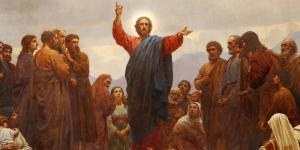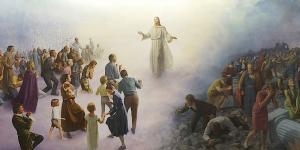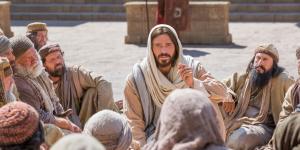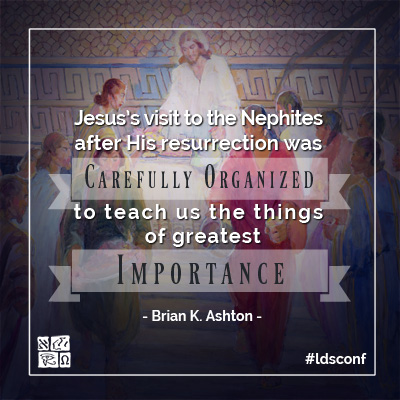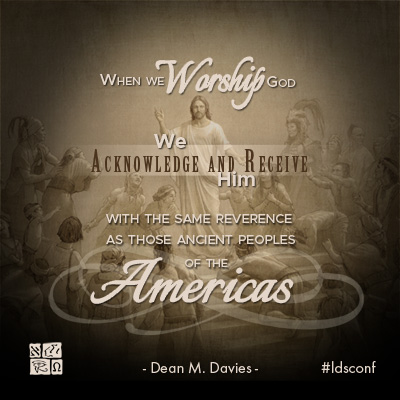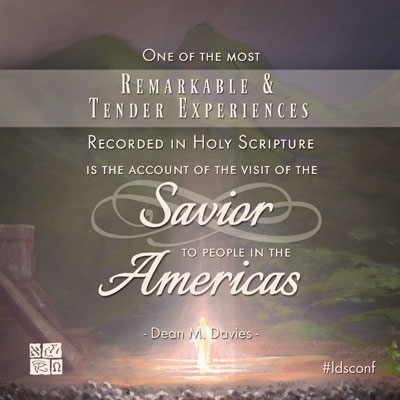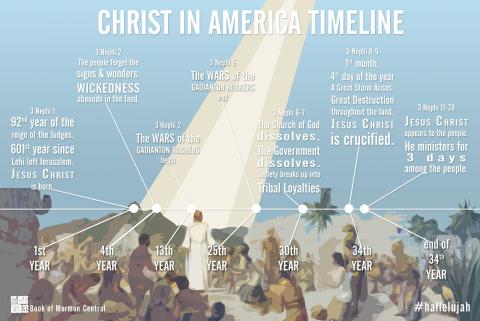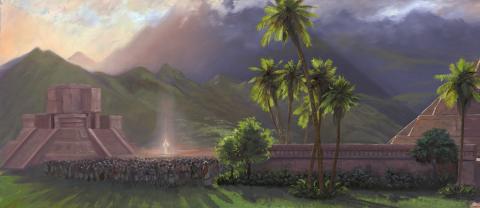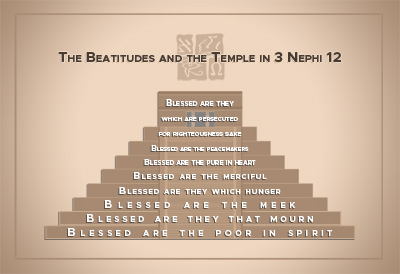You are here
Book of Mormon Central is in the process of migrating to our new Scripture Central website.
We ask for your patience during this transition. Over the coming weeks, all pages of bookofmormoncentral.org will be redirected to their corresponding page on scripturecentral.org, resulting in minimal disruption.

Scripture Block
3 Nephi 12-15
To encourage class members to be true disciples of Jesus Christ by following His example and by living the higher law that He taught to the Nephites.
KnoWhys
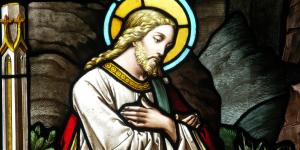
Why Is the Lord's Prayer Different in 3 Nephi?
3 Nephi 13:9

What Makes 3 Nephi the Holy of Holies of the Book of Mormon?
3 Nephi 14:13-14
Articles
Overview
Bokovoy, David E., and John A. Tvedtnes. "Christ in the Old Testament and the Book of Mormon." In Testaments: Links between the Book of Mormon and the Hebrew Bible, 7-23. Toelle, UT: Heritage Press, 2003.
All of the key events, doctrines, and people of the Hebrew Bible point directly to Jesus’ role as the Anointed One of Israel. This is the inspired message proclaimed so passionately by the ancient authors of the Book of Mormon: Jesus is the link between the Book of Mormon and the Hebrew Bible.
Holland, Jeffrey R.. Atonement of Jesus Christ In Encyclopedia of Mormonism, Edited by Daniel H. Ludlow. Vol. 1. New York: Macmillan, 1992.
An encyclopedic entry on the Atonement of Jesus Christ, as explained by Elder Jeffrey R. Holland. The Atonement is the core tenet of Christianity, and is the central focus of the Book of Mormon.
Matthews, Robert J.. "Jesus the Savior in 3 Nephi." In The Book of Mormon: 3 Nephi 9-30, This is My Gospel, edited by Monte S. Nyman and Charles D. Tate, Jr., 25-39. Provo, UT: Religious Studies Center, 1993.
This article discusses Jesus Christ's role in 3 Nephi. Third Nephi offers greater insight into the activity and scope of Jesus' work than that found in the New Testament alone. Matthew discusses the anticipation of Christ's coming, his miraculous appearance in the Americas, the doctrines he taught, and how Jesus Christ's coming is significant for the message of the Book of Mormon and the Gospel of Jesus Christ.
Millet, Robert L., Gary Lee Walker, Jerry C. Giles, Gerald Hansen, Jr., Andrew C. Skinner, Philip J. Schaelling, Daniel C. Peterson, Merril C. Oaks, Tad R. Callister, John Gee et al. Jesus Christ In Encyclopedia of Mormonism, Edited by Daniel H. Ludlow. Vol. 2. New York: Macmillan, 1992.
Encyclopedic entry on Jesus Christ, as he is understood in Mormon theology. Jesus Christ plays a central role in the Book of Mormon, especially when he appears to the Nephites in 3 Nephi.
Nelson, Russell M.. "Jesus the Christ - Our Master and More." In A Book of Mormon Treasury: Gospel Insights from General Authorities and Religious Educators, 19-31. Provo, UT: Religious Studies Center, 2003.
In a thoughtful overview, Elder Russell M. Nelson discusses how Jesus Christ fulfills each of Biblical and Book of Mormon titles attributed to him.
Seely, David R.. Jehovah, Jesus Christ In Encyclopedia of Mormonism, Edited by Daniel H. Ludlow. Vol. 2. New York: Macmillan, 1992.
An Encycopedic entry emphasizing the messianic role of Jesus Christ in Mormonism. Jesus Christ is the Jehovah and God of the Old Testament and was prophesied to come down to earth to redeem his people.
Welch. John W. "Seeing Third Nephi as the Holy of Holies of the Book of Mormon." Journal of the Book of Mormon and Restoration Scripture 19, no. 1 (2010): 36-55.
Third Nephi and its account of the ministry of the resurrected Jesus to the Nephites has long been seen as the pinnacle of the Book of Mormon. This text can also be viewed as the Holy of Holies of the Book of Mormon. Everything in 3 Nephi, especially the ministry of the Savior, echoes themes related to the temple and the presence of the Lord in the Holy of Holies. Themes such as silence, timelessness, unity, awe, and consecration confirm this interpretation.
Hyde, Paul Nolan. A Comprehensive Commentary of the Book of 3 Nephi. Orem, UT: Parrish Press, 2015.
Kimball, Linda Hoffman. "The Coming of Christ." In The Reader's Book of Mormon: The Coming of Christ: Helaman 5 – 3 Nephi, edited by Robert A. Rees and Eugene England, vii-xxix. Salt Lake City: Signature Books, 2008.
3 Nephi 12
Brown, S. Kent. “Moses and Jesus: The Old Adorns the New,” in From Jerusalem to Zarahemla: Literary and Historical Studies of the Book of Mormon. Provo, UT: Religious Studies Center, Brigham Young University, 1998, 157–168.
Scriptures draw on the experiences of Moses to teach about the Savior and his mission. For example, the gospel writers illumined ties between Moses and Jesus through their depiction of events such as the Sermon on the Mount. In 3 Nephi, the risen Lord himself cites Isaiah’s prophecies of a ‘‘new exodus” to instruct his audience about the gathering of Israel in the last days. By miraculously providing bread and wine, and by identifying himself as the law and the light, the Savior established himself as one greater than Moses. On a deeper level, the Book of Mormon links together the deliverance of the children of Israel through the intervention of Jehovah and the freeing of the Nephites and Lamanites from spiritual bondage through the visitation of the resurrected Christ.
Sperry, Sidney B. "The Book of Mormon and the Problem of the Sermon on the Mount." Journal of Book of Mormon Studies 4, no. 1 (1995): 153-65.
The Sermon on the Mount in 3 Nephi parallels the accounts in Matthew and Luke, although it is closer to Matthew. The sermon was addressed partly to a general audience and partly to the twelve disciples exclusively, although the crowd heard it. In many cases the account in 3 Nephi clarifies the New Testament accounts; in particular, the Joseph Smith Translation and Book of Mormon explain the Lord’s Prayer.
Updegraff, Robert Timothy. "The Sermon on the Mount" in To All the World: The Book of Mormon Articles from the Encyclopedia of Mormonism. Provo, UT: FARMS, 2000.
An encyclopedic entry on the Sermon on the Mount and how it is used in the Book of Mormon.
Welch, John W. Illuminating the Sermon at the Temple and the Sermon on the Mount. Provo, UT: FARMS, 1998.
John W. Welch examines the teachings and commandments of the Sermon on the Mount in its Book of Mormon setting—at the Nephite temple, in connection with sacred ordinances of covenant making. This context opens new insights into the meaning and significance of the Sermon whereby readers never again see the Sermon the same.
Welch, John W. The Sermon at the Temple and the Sermon on the Mount. Provo, UT: FARMS, 2010.
The Sermon at the Temple and the Sermon on the Mount, by John W. Welch, offers, for the first time, a thorough Latter-day Saint interpretation of Jesus’ famous sermon. The author relies especially on crucial information and details that only the Book of Mormon can supply.
3 Nephi 13
Bergin, Sue. Lord's Prayer In Encyclopedia of Mormonism, Edited by Daniel H. Ludlow. Vol. 2. New York: Macmillan, 1992.
Encyclopedic entry on the Lord's Prayer found in the New Testament, and how Jesus Christ uses it in 3 Nephi.
Parry, Donald W. “‘Pray Always’: Learning to Pray as Jesus Prayed.” In The Book of Mormon: 3 Nephi 9–30, This Is My Gospel. Provo, UT: Religious Studies Center, Brigham Young University, 1993, 137.
Parry discusses the purpose and process of prayer, drawing on the teaching of Jesus Christ among the Nephites in 3 Nephi 11-20.
Parry, Donald W. "'After This Manner...Pray Ye'" Ensign. January 1996.
In ten chapters of 3 Nephi, the Savior gives remarkable teachings on prayer that can shape our entire lives.
Welch, John W.. "Two Notes on the Lord’s Prayer." In Pressing Forward with the Book of Mormon: The FARMS Updates of the 1990s, edited by John W. Welch and Melvin J. Thorne, 228-230. Provo, UT: FARMS, 1999.
Welch compares the Lord's Prayer in the synoptic gospels with the version found in 3 Nephi. He discusses the phrases "lead us not into temptation" and "for thine is the kingdom."
Welch, John W. “The Lord’s Prayer,” Ensign. January 1976, online at lds.org.
Welch emphasizes the importance of learning from the prayers of Jesus Christ found in scripture. There are few instances, but each one fills our lives with richer meaning. As part of this discussion, Welch draws on the Lord's Prayer and Christ's prayer on behalf of the Nephites in 3 Nephi.
3 Nephi 14
Welch, John W., and Daniel McKinlay. "Getting Things Strai[gh]t." In Reexploring the Book of Mormon, edited by John W. Welch, 260-262. Provo, UT: FARMS, 1992.
In 3 Nephi 14:13, Jesus exhorts the people to enter "in at the strait gate." This article discusses the differences between the uses of "strait" and "straight" in scripture.
3 Nephi 15
Welch, John W. "Reusages of the Words of Christ." Journal of Book of Mormon Studies 22, no. 1 (2013): 62-72.
This is an excerpt from and summary of an article by John W. Welch that appeared as “Echoes from the Sermon on the Mount,” in The Sermon on the Mount in Latter-day Scripture.
John W. Welch, “Echoes from the Sermon on the Mount,” in The Sermon on the Mount in Latter-day Scripture, ed. Gaye Strathearn, Thomas A. Wayment, and Daniel L. Belnap (Provo, UT: Religious Studies Center, Brigham Young University; Salt Lake City: Deseret Book, 2010), 312–40.
Jesus quoted key phrases, often in inverted order, from the Sermon on the Mount (3 Nephi 12–14) in subsequent Book of Mormon chapters (3 Nephi 15–28), thus demonstrating that the sermon was accepted as an authoritative text establishing and defining Jesus’s kingdom on earth. Although rarely considered in this light, Peter, James, Paul, and the gospel writers quoted from all parts of the Sermon on the Mount, similarly substantiating the authoritative functions of the sermon as a foundational text in early Christianity. Literary analysis supports the ideas that these quotations were intentional, that an awareness of the sermon was widespread in the earliest decades of Christianity, and that audiences to which Jesus and his apostles spoke were familiar with the teachings and commandments found in the Sermon on the Mount.
Additional Lesson Guides
LDS Living Gospel Doctrine Lesson #38
RSC Gospel Doctrine Lesson #38
Meridian Magazine Gospel Doctrine Lesson #38
GospelDoctrine.com 3 Nephi 12, 3 Nephi 13, 3 Nephi 14, 3 Nephi 15
Feast Upon the Word Gospel Doctrine Lesson #38

